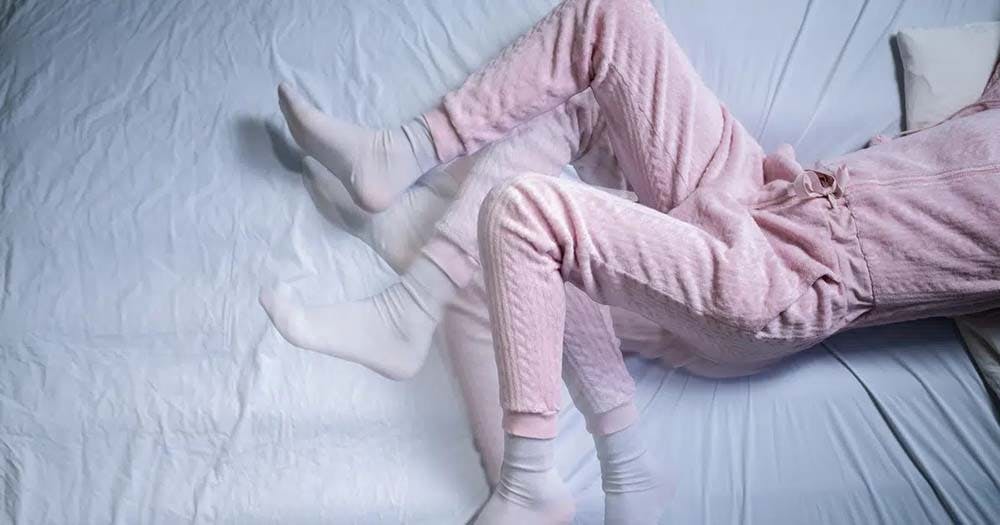Feb 03, 2022
A Guide to Restless Leg Syndrome

Around 70% of Americans suffer from sleep disorders that interfere with their quality and quantity of sleep and cause numerous other physical and mental health conditions.
One of the most common sleep disorders, aside from insomnia, is a condition known as restless leg syndrome (RLS). In fact, RLS affects around 5%-10% of adults and 2%-4% of children in the United States.
Recognizing RLS symptoms is one of the first steps to receiving proper treatment for the condition and ultimately, getting a better night's sleep.
What is restless leg syndrome?
RLS is a neurological sleep disorder which causes an irresistible urge and sensation to move the legs. While the feelings aren't like numbness or muscle cramping, people who suffer from RLS often describe the sensations as:
Creeping
Pulling
Throbbing
Aching
Itching
Electric
What are common symptoms of restless leg syndrome?
Sensations that usually start when resting
The feeling typically begins after you've been lying down or inactive for an extended time, like sitting down working, watching a movie, or in the car. Many people say the feelings are worse when lying down.
Relief with movement
You may feel relief from the discomfort and creeping sensations by moving the legs. This movement can include:
stretching
shaking your legs
massaging your legs
pacing
walking
Heightened symptoms in the evening
Symptoms are more noticeable at night, just after you lay down or start to feel drowsy.
Nighttime leg twitching
Many people with RLS also suffer from periodic limb movement disorder (PLMD), a condition in which a person's legs twitch or jerk uncontrollably during sleep. You can also experience PLMD and RLS in your arms.
Disruptive sleep
RLS can cause issues with your ability to fall asleep or stay asleep. It often results in fragmented sleep, leading to insomnia.
People with severe cases of RLS usually clock less than five hours of sleep per night. Milder cases may not disturb how much sleep you get but can still affect the quality of your sleep overall.
Other health issues
Since RLS affects the quality and amount of sleep one gets, it can lead to other health conditions. People with RLS may suffer from; difficulty concentrating during the day, mood swings, depression, increased risk of accidents, or chronic medical conditions, such as heart disease, stroke, and obesity.
What treatment options are available for restless leg syndrome?
Treatment for RLS includes medications, lifestyle changes, and often a combination of both.
Lifestyle changes
Making one or a few changes to your life may help improve your symptoms of RLS. These lifestyle changes can include:
Cut back/eliminate alcohol, caffeine, and tobacco use.
Taking a hot bath before bedtime
Relax before bed by meditating, practicing yoga, or reading a book.
Applying a warm or cool compress to your legs
Light to moderate physical activity. (Too much exercise or exercising late in the day may make RLS symptoms worse)
Developing healthy sleep hygiene; going to bed at the same time every night, creating an ideal sleep environment (appropriate temperature, room darkening curtains, comfortable sheets), not using electronics right before bed, etc.
Medications
Medicine(s) may be an important part of your treatment strategy if you are experiencing frequent or severe RLS symptoms.
The FDA has approved four drugs for treating RLS:
Your doctor may also check your iron levels and if they are low, prescribe an iron supplement.
Other medications are used off-label, meaning that they are prescribed to treat a condition outside of what is FDA-approved for. These prescription drugs include:
Anticonvulsants, such as gabapentin, and lamotrigine
Opioids, including tramadol, codeine, oxycodone, and hydrocodone. These medications can be highly addictive, so please consult your physician before starting.
Muscle relaxants (benzodiazepines) and sleep aides- Most often prescribed when other treatments fail to provide relief. These medications help you sleep at night but don't get rid of the leg sensations.
Many cases of RLS need a combination of medicines, and your doctor may need to try a few medications before finding the right one for your case.
Final thoughts
It's common for people to wait years before seeking treatment because they don't see RLS as a serious health concern. However, untreated RLS can lead to more recurring and severe symptoms.
If you are experiencing any RLS symptoms, consult your doctor right away. They can help you find a treatment plan that works for you.
At CareCard, we are passionate about helping make your prescription payments more affordable, saving members up to 85% on prescription drugs and medications. Learn how CareCard can help make your medication payments more manageable.